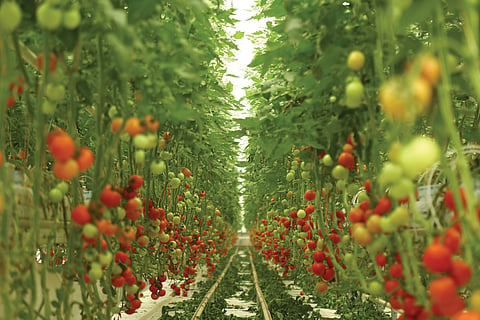A novel way of food production
Hydroponics does not use soil, instead the root system is supported using an inert medium like perlite, rockwool, clay pellets, peat moss or vermiculite.
Plants grow through photosynthesis, in which they use sunlight and Chlorophyll present in the leaves to convert carbon dioxide from the air and water into glucose (a type of sugar) and oxygen. What they do need is water and nutrients, obtained from soil in regular farming and from a nutrient-rich solution in Hydroponics.
Scandinavian countries use hydroponics to grow crops in winter as it allows plants to grow indoors. The Asia Pacific region too is witnessing a spurt in such facilities. It’s for the same reason that Dharampal Satyapal (DS) group decided to invest in hydroponics facility – called Natures Miracle - in Greater Noida.
With a turnover of $1 billion, and having a strong presence in snacks foods, beverages, spices, dairy, mouth fresheners, hospitality, retail, packaging, and agro forestry, the group decided to make forays into hydroponics and set up a facility in an area of 2 hectares, three years back (2016).
"The products that are grown here in the glasshouse (different types of tomatoes, strawberries, bell peppers, and cucumbers) are better than any in the market, they are healthy, fresh, with consistent taste as a result of which they are a great option to snack on. We take care of our products like our own children, to keep them happy we even play music in the facility,” says, Anchal Kumar, Partner, Nature’s Miracle.
Nature’s Miracle is the only of its kind facility in India – it is a fully-automated glasshouse with the precision of Dutch-Hydrophonic technology.
As of now nearly 14 to 18 tonnes of produce is grown there every month and these products are sent across 12 cities in India which includes: Delhi, NCR, Mumbai, Lucknow, Kanpur, Dehradun, Haldwani, Indore, Bhopal, Chandigarh, Zirakpur and Jalandhar.
"In a few years time we would make more such facilities across different locations in India," says Anchal adding that since the parent company is cash-rich the capital was raised via owners equity investment (which they don’t want to disclose).
"Nature’s Miracle is the first project in India with such a high level of computer-controlled greenhouses and equipment, located in Greater Noida. I am proud to be a part of this project. The Indian team has picked up the basics well as this is a self-learning facility," says their Dutch partner René Zwinkels.
"Candy Tomatoes, Snack Cucumbers & Circus Mix (having cucumber, tomatoes and sweet peppers) are very healthy snacks that can fill your appetite for about three hours with the lowest amount of calories. Keeps you fit all day," says nutritionist Reeta Shanker Seth.
The cost of 250 gms of red/yellow cherry tomatoes (Natures Miracle) is Rs 150, sweet snack peppers (150 gm) is Rs 150 and Candy tomatoes (250) is Rs 150. These are available across food markets like Foodhall, Le Marche and many similar stores, besides hotels and restaurants!
Interestingly, the DS Group forayed into the Agro-Forestry business in 2006 by acquiring waste, semi-arid and fallow lands in Madhya Pradesh. They grow medicinal and aromatic plants here like Sandalwood. Besides, they also cultivate horticultural crops in parts of Madhya Pradesh where there were water shortages (which they overcame with water harvesting and conservation).
"We always dreamt of world-class agricultural practices being introduced in India. So, we researched, planned, collaborated with experts, and now take pride in having set up one of the first fully automated hydroponic glass greenhouse in India. This involved bringing together the best minds from India and hydroponic technology experts from the Netherlands,’’ says a spokesman of the group.
"The hanging gardens of Babylon, the floating gardens of the Aztecs of Mexico and those of the Chinese are examples of 'Hydroponic' culture. Egyptian hieroglyphic records dating back several hundred years B.C. describe the growing of plants in water," as described in Hydroponic food production by Howard M. Resh.
Hydroponic vegetables and fruits are given favourable conditions and individual climatic conditions through an automatically temperature-controlled greenhouse. This means that these products can be grown all year round without using any artificial means to enhance their growth and still save up to 90 per cent water than regular farming. Hydroponics is proven to be far more lucrative than most organic vegetable farming in India.
According to Mordor Intelligence, the Global Hydroponics Market was valued at $ 23.94 billion in 2018 and is expected to register a CAGR of 6.8 per cent during the forecast period (2019-2024). In 2018, Europe is the largest geographic segment of the market studied and accounted for a share of around 47.3 per cent of the overall market however Africa is the fastest growing.
In India too many farmers have set up similar facilities on a smaller scale across various states. Since hydroponics is slated to be the future of farming, India wouldn’t lag behind in set up more such facilities!

